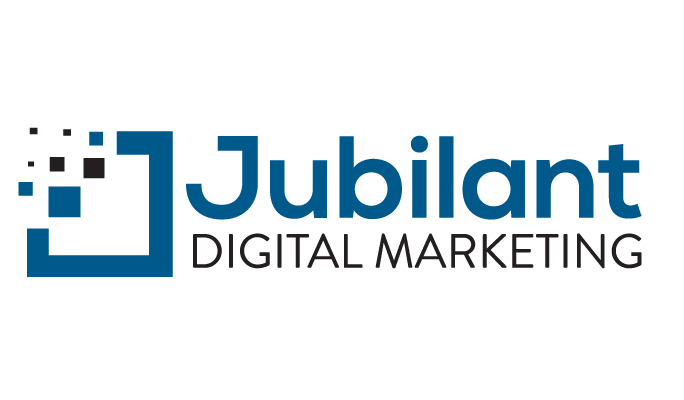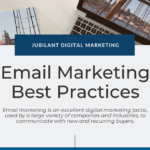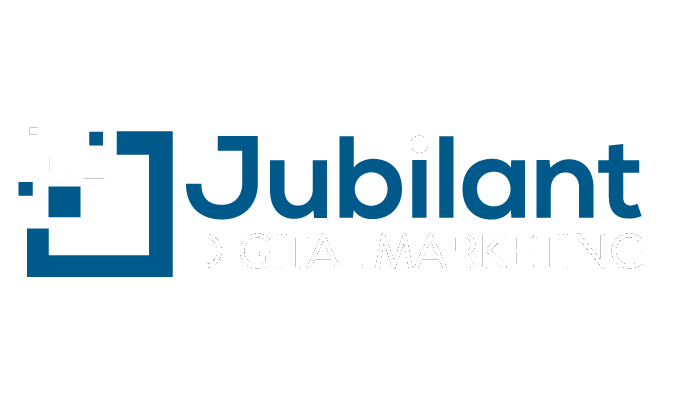A Guide to Paid Search Management
At Jubilant, we strive for excellence in reaching each client’s goals. Gavin Hodges, head of Jubilant’s Paid Search Team, leads us in the daily pursuit of success for our clients. For Gavin, success in paid search management is not stagnant. People often ask, “How do you define success in a paid search campaign?” or “What’s the advantage of a paid search campaign?” and as always, Gavin helps give us a well-rounded look at some commonly asked paid search questions.
 What are the greatest benefits of paid search?
What are the greatest benefits of paid search?
A paid search campaign is, in a sense, a “fast pass” to the front of the Google line, said Gavin. Paid search gives companies an opportunity to be seen, get noticed and get their brand messaging across.
How can paid search help someone’s business?
Generally speaking, paid search can help almost all businesses, but can be particularly advantageous for small businesses. It can give smaller businesses the chance to stand out and make themselves known.
What should every paid search campaign include?
According to Gavin, being organized is the best start to a successful paid search campaign. “Paid search campaigns should have a well thought out and organized structure. You can think of it like your kitchen space – sure, you can still cook around the sink that is piled up with dishes or the stovetop with leftover food and pots on it, but you will function better without those distractions and the ability to get right to ‘cooking up’ what you want. The more thought and more structure that is put into things from the beginning make the campaign easier to work within. The cleaner and easier it will be, the more efficient and better-informed decisions you can make. From there, continual management and optimization is an obvious must, but it will be easier and more efficient than if you are constantly ‘working around the dishes and/or smelling the old food.’”
What’s one thing you think someone should know about paid search management?
Simply put, “the more you put into it, the more you get out of it,” according to Gavin, “you want to invest time in the front end to make your life easier on the back end. I like to think of it like a piece of art. Sure, you could draw something like the city skyline in five minutes, but as you can imagine, it would probably not be very detailed or thorough. Give someone an hour, or even a day, to draw it and you would likely see a considerable difference and improvement.”
What are the most common mistakes people make when managing a paid search account?
“Each campaign you have should stand on its own – with its own goal and purpose. Avoid duplication and competing against yourself unless this is by intent. For example, if you have multiple services and are targeting multiple locations you may want to adjust your messaging for each, but want the same keywords targeted. This approach will naturally avoid competing with each other, so that type of duplication is fine. When auditing new accounts, or even diving into long-standing accounts, this is a common occurrence I see which can and should be avoided. You will have enough competition from others, no need to add yourself to that list.”
What’s the most exciting thing about running a paid search campaign?
For Gavin, it’s the challenge. “It’s how do I figure out who my target audience is? How do I make this work? How do I get the campaign humming? It’s chasing those things down and figuring them out, which starts in the beginning. You want to be prepared and set everything up properly to come out of the gate swinging. It’s all in the preparation and planning. It’s the ever-changing nature and the constant challenge – that’s what I like. It’s the variety of clients and their goals and navigating those different challenges and goals on a daily basis.”
What does your day-to-day look like when you’re running a paid search campaign?
“It’s a lot of filtering through the data or, ‘weeds’ as we put it, to see what’s working and what’s not – whether that’s at a high-level like monitoring spend attribution at the campaign level or pausing keywords, to adjusting ad schedules, location targeting or going down a rabbit hole of conversion tracking at deeper levels,” said Gavin. “Beyond that, you are working with your account manager or directly with the client to communicate progress or hold-ups to stay on top of everything and hit your goals”
With paid search management, every day is different. “Overall, there is a great deal of variety in my days. The things that stay relatively the same are checking pacing, communicating with clients and knocking out to-do lists of random projects and tasks for various accounts.”
What would you say to someone who tells you they’ve tried paid search in the past but it didn’t work as well as they hoped?
“A lot of people expect that because they put money out there on paid search they will see the returns immediately and that they’ll be in the front of the line and all eyes will be on them. Simply put, you do get to jump to the front of the line and start seeing results immediately, unlike the SEO or organic side of things, but that does not mean you will like the results from the start. Paid search is ever-evolving. Don’t get discouraged too quickly – yes, it moves faster and you see results faster, but it’s not a sprint per-say. You have to adapt and change strategy as you go along. If it has not worked in the past or you are currently struggling with your account, I would recommend taking a step back and re-evaluating things as a whole to determine any areas of weakness and adjust accordingly.”
How do you measure success when you’re managing a paid search campaign?
“The simple answer – if the client is happy with the results you’re putting forward and they fall in line with their expectations and goals, you are golden. If the client wanted traffic and you’re getting traffic, then that’s a success. For me personally, however, there’s also a secondary measure of success. After I’ve hit those goals, I want to continue to beat them. It’s about improving things on a continual basis. There is certainly the temptation to stop at that point, but I think building on that initial success, moving forward, and evolving and adapting continually to stay ahead of the curve is the real goal for an ever-moving bar for success. I am not saying you should expect and shoot for a record-setting month always but that in the grand scheme of things, results are trending in a positive direction continually versus staying stagnant.”
Closing thoughts
“Upon completing my optimizations or initial build-outs, I like to think from an outside perspective. Meaning, if I were a third party and auditing the account, what holes could I poke? You should view your clients’ account and spend as if it was your own and you are using your own funds. Think, ‘is this as good as it can be at this moment?’ It’s all about staying on top of the account, putting the work in, and not skipping corners. General best practices go a long way but are easily forgotten or overlooked.”
Undoubtedly, there are always situations and strategies that evolve within paid search management. At Jubilant, we’re lucky to have an excellent team of paid search managers to help us navigate the ever-changing environment of paid search. If you’re curious to learn more about how our paid search management services could potentially help your business, please don’t hesitate to contact us or give us a call at 913-428-9508. We’d love to see how we can support your business.





